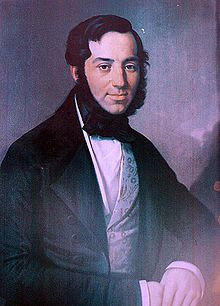František Škroup

František Škroup (also: Franz Škroup or Skraup ; born June 3, 1801 in Osice near Königgrätz / Hradec Králové ; † February 7, 1862 in Rotterdam ) was a Czech composer and conductor .
Life
The son of the cantor Josef Dominik Škroup received musical training from his father. He first appeared publicly as a flautist at the age of eight. After attending grammar school in Königgrätz , he studied law in Prague from 1819. He financed his studies through music lessons and auxiliary work in the estates theater . There he met the composer Jan Alois Jelen .
Škroup became increasingly involved in amateur theater and in 1823, together with other patriots, founded the first Bohemian Opera Association, which performed Czech operas for the first time in Prague. On December 23, 1823, the popular opera Die Schweizer Familie by the Austrian composer Joseph Weigl , which the philosophy student and poet Simeon Karel Macháček had translated into Czech, was played in the Estates Theater . The opera was performed by amateur actors and animated Škroup to compose the first Czech opera Dráteník ( Eng . The Wire Tie ).
The successful premiere took place on February 2, 1826 in the Estates Theater. Spurred on by this success, Škroup wrote the music for the operas Oldřich a Božena and Libušin sňatek . However, these works were no longer so well received by the public. In 1827, Škroup was appointed second conductor of the Estates Theater, where he took over the musical direction ten years later. He held this position for another twenty years. The music for the comedy by Josef Kajetán Tyl Fidlovačka aneb žádný hněv a žádná rvačka brought him immortality . When it was first performed on December 21, 1834, the song by the blind beggar Mareš Kde domov můj was heard for the first time and was later chosen as the Czech anthem.
František Škroup was an excellent conductor. He staged numerous classical operas and composed preludes as well as background music for theater and comedies. From 1836 to 1845 he was also active as the Regens Chori at the synagogue. After thirty years of activity, he was dismissed from the theater management and retired in 1857 because his works were not very successful. In addition, there were disputes with the then director Stögr. Since Škroup could no longer find a job in Prague, he took the position of Kapellmeister at the Deutsche Oper in Rotterdam in 1860. He died two years later and was buried in the local Protestant cemetery.
Škroup was married twice. His son Alfred became a conductor and music publisher, his daughter Božena was a music teacher. Son Oldřich died at the age of 11.
His brother Jan Nepomuk Škroup was also a composer.
Works
František Škroup also appeared as a singer in the tenor and baritone voices . As a leading figure at the Estates Theater, he made a contribution to the world premiere of works by famous composers such as Richard Wagner . Most of his works, written in Czech and German, are operas that reached a good level, but did not become known beyond the border of the country. From 1837 to 1839, Škroup also edited the magazine "Věnec ze zpěvů vlastenských uvitý a obětovaný dívkám vlastenským" (A wreath of patriotic songs knotted and dedicated to patriotic girls ).
- The Singspiel Dráteník ( Eng . The Wire Tie ) from 1825 was premiered on February 2, 1826. It was considered the beginning of Czech opera. The libretto is by Josef Krasoslav Chmelenský . Škroup sang the main role here.
- The premiere of the opera Oldřich a Božena based on the libretto by Josef Krasoslav Chmelenský was in 1828; performed again in 1847. The German-language version Uldarich and Božena premiered in 1833.
- The premiere of The Prince and the Snake was in 1829, the Czech version Princ a had neb Amor mezi Amazonkami was first performed in 1835.
- The Dragon Cave , premiered in 1832
- Fidlovačka aneb žádný hněv a žádná rvačka
- Libušin sňatek , libretto Chmelenský, premiered in 1835, completely revised and performed again in 1850
- Pouť k chrámu umění , premiered in 1846
- Columbus , libretto Chmelenský, composed 1855, premiered in Czech by František Pujman in 1945 in the National Theater and as a radio recording.
- The ghost bride
- Drahomíra
- The sea geuse
literature
- Constantin von Wurzbach : Škroup, Franz . In: Biographisches Lexikon des Kaiserthums Oesterreich . 35th part. Kaiserlich-Königliche Hof- und Staatsdruckerei, Vienna 1877, pp. 98-104 ( digitized version ).
- Josef Plavec: František Škroup . Prague 1941.
- Jiří Kocourek: František Škroup: Přemožitelé času . Prague 1989.
Web links
- Sheet music and audio files by František Škroup in the International Music Score Library Project
- List of the stage works by František Škroup based on the MGG at Operone
Individual evidence
- ↑ a b c d Clive Unger-Hamilton, Neil Fairbairn, Derek Walters; German arrangement: Christian Barth, Holger Fliessbach, Horst Leuchtmann, et al .: The music - 1000 years of illustrated music history . Unipart-Verlag, Stuttgart 1983, ISBN 3-8122-0132-1 , p. 112 .
| personal data | |
|---|---|
| SURNAME | Škroup, František |
| ALTERNATIVE NAMES | Škroup, Franz |
| BRIEF DESCRIPTION | Czech composer and conductor |
| DATE OF BIRTH | June 3, 1801 |
| PLACE OF BIRTH | Osice near Hradec Králové |
| DATE OF DEATH | February 7, 1862 |
| Place of death | Rotterdam |